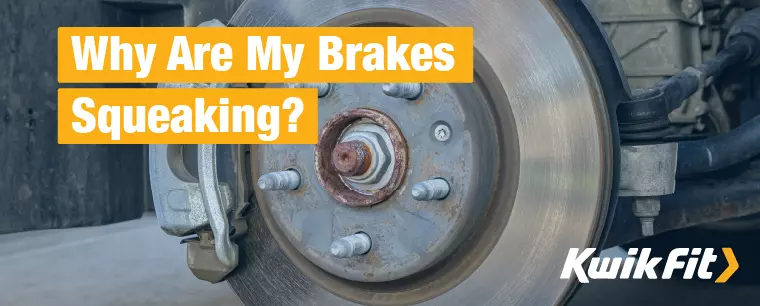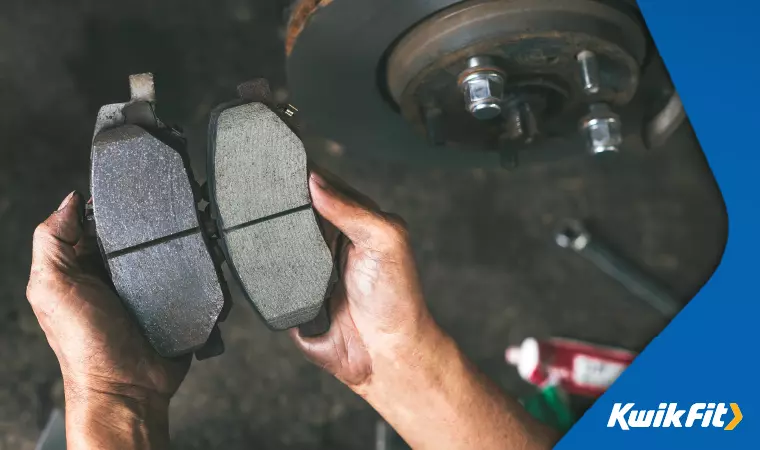Why Are My Brakes Squeaking?
Jack Dreyer | Wednesday 13th April 2022 1:30pm

There are numerous reasons why your brakes could be squeaking ó and their implications vary in severity. If you do hear high-pitched sounds coming from your brakes, itís important to get to the bottom of it as soon as you can to avoid developing (or ignoring) a more serious problem.
To help you stay safe on the roads, here are some of the most common causes of squeaky brakes!
Why do my brakes squeak?
Weather Conditions
Make a note of when your brakes sound the loudest. Is it on the coldest winter days? It may be that the low temperatures are causing them to squeak; moisture can freeze between your brake pads and cause them to stick momentarily and make a noise.
While this is certainly annoying, there isnít necessarily anything you can (or need to) do about it. See if the noises stop when your car (and the weather) has warmed up.
Keep in mind, though, that if the sound seems to get worse or you notice any impact on how braking feels, there could be more to blame than the weather! In fact, rain and ice freezing between your brake pads can cause them to rust over time ó which might be the reason for the squeaking noise.
Heavy loads
If you regularly carry lots of passengers or shift heavy loads in your car, then you may find that the brakes squeak more than they should. The heavier your vehicle, the more energy it will take to slow it down, which puts more pressure on the brakes. As the brakes get hot, the metal can swell, making the noise worse. Again, this is not necessarily an emergency ó but you may want to get your brakes checked more frequently, as they could wear down faster.
Moisture
You may notice that your brakes make a grinding noise in the morning. This sound is likely to be less of a squeak and more of a grating noise. When the car has been left unused overnight, moisture can build up around the brake pads, which can even lead to the creation of a thin layer of brown rust. The first time you apply the brakes in the morning, this rust will be removed, as will any excess moisture.
Embedded objects
Thereís a lot of grit, sand, stone, and other material on the roads that can become embedded in your brakes. You usually wonít notice these, unless a particularly large stone has become stuck. In most cases, the noise you can hear is the stone being pushed into the brake pad by the caliper. This can cause minor damage to your brakes, but the stone should become loose by itself and work its way out.
If youíre concerned about a particularly loud sound, though, itís always worth taking your car to your local garage for a once-over.
Worn-down brake pads
In most cases, the root cause of the squeaking noise is that your brake pads have worn too thin. As you press the brake pedal, the brake caliper will clamp around the pad, applying pressure to slow the wheel down. When this happens, friction is created that turns into heat, dispelling the kinetic energy that the car has produced through moving.
Imagine that every time the brakes are applied, a very thin layer of metal is shaved off the pad. Over time, this will cause your pads to become thinner and thinner until, eventually, they need replacing. The squeaking that you can hear from worn-down brake pads is metal dragging along the metal on the disc. It means that you have reached the recommended wear limit and should take your car to a repair centre to have your pads swapped for new ones.
If youíre worried about the quality of your brakes, head to your nearest Kwik Fit for a free brake check.

New car
When you get a new vehicle, you may find that the brakes are squeaking. Donít panic ó this doesnít mean that you need to replace them so soon. Itís likely that they just need bedding in. The bedding-in process can be complicated, but really it just involves stress-testing your brakes at higher and higher speeds.
Find a quiet, open stretch of road where youíll be safe to stop and start. Start off by accelerating to 30/40 mph and then braking back down to 5 mph. Repeat this process up to 3 times before doing the same but accelerating to 50 mph before braking. Repeat this a few times more, then follow with a short drive just to cool off the brakes. Doing this wears down the transfer layer on the pads so that itís completely even and can help you avoid squeaking and issues with your new brakes.
How to stop squeaky brakes
The solution to your carís squeaky brakes problem will depend on the cause. In many cases, itís only temporary and will resolve itself with time. But if itís really grinding your gears, or you feel a noticeable difference when braking, be sure to visit your local garage to stay on the safe side ó itís no good taking risks with something as vital as your brakes, after all.
The team at Kwik Fit can help assess whether your brake pads have worn too thin and need replacing or whether, perhaps, they need some kind of lubrication. Whatever the cause, weíll have you back on the road as soon as possible!
Any facts, figures and prices shown in our blog articles are correct at time of publication.
Featured Articles
Is it Illegal to Drive With One Headlight?
Saturday 19th July 2025
Wondering if itís illegal to drive with one headlight? Learn about the safety risks and penalties of illegal blown bulbs and why you should fix them promptly.
Air Con in EVs & Hybrids: Experts Answer Your Questions
Monday 30th June 2025
Does air con drain EV batteries? Can you use the air con while charging an electric car? Find out the answers to these questions & more from Kwik Fitís experts.
Why Is Your Car Making a Noise? Fixes & Tips
Friday 13th June 2025
When your car starts making unexpected noises, it can certainly be quite disconcerting; it may be nothing to worry about, but hereís what you need to know.









